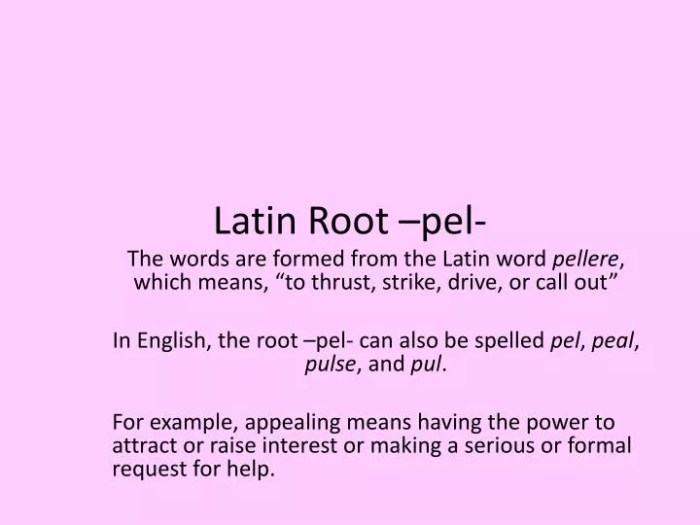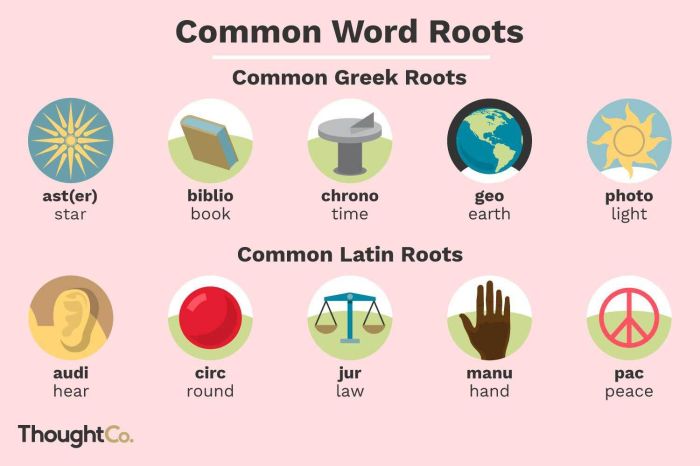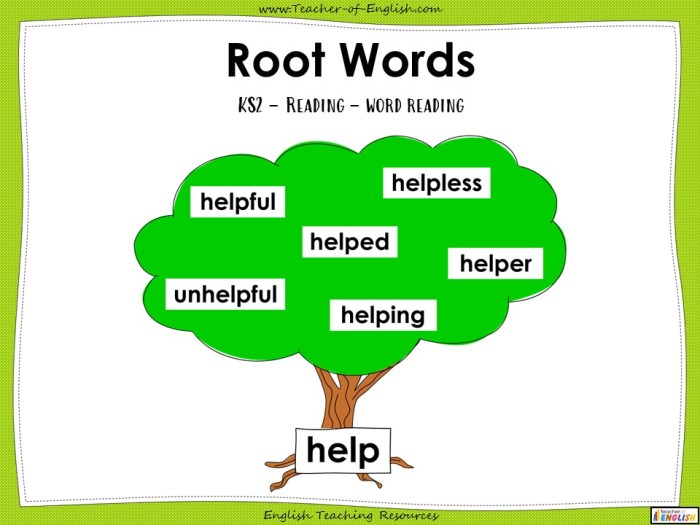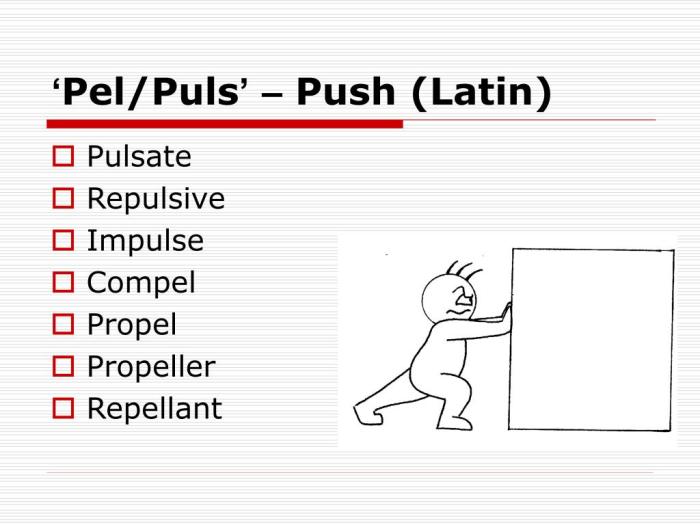Words with the root word pel – Words with the root word ‘pel’ have a rich history and diverse usage, inviting us on a linguistic journey that uncovers their etymological origins, semantic nuances, and syntactic versatility.
These words, stemming from Latin and Greek roots, have evolved over time, shaping the way we express concepts related to motion, force, and connection.
Root Word: pel

The root word “pel” is derived from the Latin word “pellere”, which means “to drive” or “to push”. It also has Greek origins, coming from the word “pello”, which means “to drive away” or “to expel”.
Examples of Words with the Root Word “pel”
Words that contain the root word “pel” typically relate to the concepts of driving, pushing, or expelling. Here are some examples:
- Compel: To force or drive someone to do something.
- Expel: To drive or force someone or something out.
- Impel: To drive or urge someone to do something.
- Propeller: A device that drives a boat or aircraft forward by pushing against the water or air.
- Repel: To drive or keep something away.
Etymology of Words with Root Word “pel”

The root word “pel” originates from the Proto-Indo-European (PIE) root “*pel-“, meaning “to drive” or “to push”. This root has been passed down through various Indo-European languages, giving rise to a diverse range of words related to movement and control.
In ancient Greek, the word “pello” (πέλλω) meant “to drive” or “to chase”. From this, we derive the English words “expel” and “compel”, both of which involve the idea of forcing something out or into a particular direction.
In Latin, the word “pellere” also meant “to drive” or “to push”. This gave rise to the English words “propel”, “repel”, and “impel”, which all involve the concept of applying force to move something.
In Old English, the word “pel” meant “to strike” or “to beat”. This gave rise to the English word “pelt”, which refers to throwing small objects at someone or something.
Over time, the meaning of words with the root word “pel” has evolved to encompass a wide range of concepts related to movement and control. From the original idea of “driving” or “pushing”, these words have come to encompass notions of forcing, propelling, repelling, striking, and beating.
Timeline of the Evolution of the Root Word “pel”
- PIE: “*pel-” (to drive, to push)
- Ancient Greek: “pello” (πέλλω) (to drive, to chase)
- Latin: “pellere” (to drive, to push)
- Old English: “pel” (to strike, to beat)
- Modern English: “expel”, “compel”, “propel”, “repel”, “impel”, “pelt”
Semantic Field of Words with Root Word “pel”

Words with the root word “pel” belong to the semantic field of “propulsion” or “movement.” They refer to actions or devices that involve driving, pushing, or sending something forward.
Words with the root word pel, such as “pellet” and “pelvic”, are found in various contexts. Even in the realm of welding, the word “pellet” is used to describe a small, cylindrical piece of filler metal used in the TIG welding process.
If you’re curious about the different parts of a TIG welding torch, check out this comprehensive guide: TIG Welding Torch Parts Name . Returning to our linguistic exploration, the root word pel continues to fascinate with its diverse applications across different fields.
These words can be further categorized into several semantic groups based on their specific meanings:
Means of Propulsion
- Propel: To drive or push something forward.
- Propeller: A device with rotating blades that propels a vehicle through water or air.
- Propulsion: The act of driving or pushing something forward.
- Propulsive: Having the ability to propel.
Devices for Propulsion
- Pelletron: A particle accelerator that uses electrostatic forces to propel charged particles.
- Pelton wheel: A water turbine that uses the force of water jets to propel its blades.
Types of Motion
- Pelagic: Relating to the open ocean, where organisms float or swim freely.
- Peltast: A lightly armed soldier in ancient Greece who fought by throwing javelins.
Morphological Analysis of Words with Root Word “pel”
The root word “pel” undergoes various morphological changes to form different words with distinct meanings and functions. These changes involve the addition of prefixes, suffixes, and infixes, which alter the root’s semantic and grammatical properties.
Prefixes
- Im-: Negation (e.g., impel, impellent)
- Com-: Together (e.g., compel, compelling)
- Pro-: Forward (e.g., propel, propulsion)
- Re-: Again (e.g., repel, repellent)
Suffixes
- -ent: Agent (e.g., impellent, repellent)
- -ance: State or quality (e.g., impellance, pellance)
- -ible: Capable of being (e.g., impellable, propellable)
Infixes
- -l-: Intensification (e.g., pellucid, compelling)
Semantic and Grammatical Effects, Words with the root word pel
The morphological changes in words with the root word “pel” significantly impact their meaning and usage. Prefixes alter the root’s semantic field, while suffixes and infixes modify its grammatical properties.
For instance, the prefix “im-” negates the meaning of “pel” in “impel,” resulting in a word that means “to hinder or obstruct.” The suffix “-ent” in “impellent” creates an agent noun, referring to something that impels. The infix “-l-” in “pellucid” intensifies the root’s meaning, indicating a high degree of transparency.
Syntactic Patterns of Words with Root Word “pel”

Words with the root word “pel” exhibit diverse syntactic patterns in sentences, fulfilling various grammatical functions. They can act as nouns, verbs, adjectives, or adverbs, each with distinct syntactic roles.
Nouns
- Appellation:Words with the root word “pel” can serve as appellations, denoting individuals or entities associated with driving or controlling vehicles.
- Occupations:They can also represent occupations related to driving, such as “pilot” or “chauffeur.”
Verbs
- Transitive Verbs:Many words with the root word “pel” function as transitive verbs, requiring a direct object to complete their meaning. For instance, “propel” means to drive or push forward.
- Intransitive Verbs:Others act as intransitive verbs, not requiring a direct object. “Propel” can also be used intransitively to mean moving or progressing.
Adjectives
- Descriptive Adjectives:Words with the root word “pel” can modify nouns, describing characteristics or qualities related to driving or controlling vehicles. For example, “propulsive” describes something that has the ability to drive or push forward.
Adverbs
- Manner Adverbs:Words with the root word “pel” can also function as manner adverbs, modifying verbs to describe how an action is performed. “Propellingly” means in a manner that drives or pushes forward.
Historical and Cultural Contexts of Words with Root Word “pel”: Words With The Root Word Pel
Words with the root word “pel” have been used throughout history and across cultures to describe a wide range of concepts and objects. The historical and cultural contexts in which these words have been used have had a significant influence on their development and usage.
Influence of Historical Events
Historical events have played a major role in the development and usage of words with the root word “pel”. For example, the word “expel” was first used in the 14th century to describe the act of driving someone out of a place.
This word was likely influenced by the historical events of the time, such as the Hundred Years’ War, which saw the expulsion of many people from their homes.
Influence of Cultural Norms
Cultural norms have also had a significant influence on the development and usage of words with the root word “pel”. For example, the word “compel” was first used in the 16th century to describe the act of forcing someone to do something.
This word was likely influenced by the cultural norms of the time, which emphasized the importance of obedience and authority.
Examples of Usage in Different Contexts
Words with the root word “pel” have been used in a variety of different historical and cultural contexts. For example, the word “impel” was used in the 17th century to describe the act of driving or urging someone to do something.
This word was likely influenced by the cultural norms of the time, which emphasized the importance of hard work and productivity.
FAQs
What is the origin of the root word ‘pel’?
The root word ‘pel’ has both Latin and Greek origins, with ‘pellere’ meaning ‘to drive’ or ‘to push’ in Latin, and ‘pelas’ meaning ‘near’ or ‘close’ in Greek.
How has the meaning of words with the root word ‘pel’ changed over time?
Words with the root word ‘pel’ have undergone semantic shifts, expanding from their original meanings related to motion and force to encompass concepts of connection, influence, and proximity.